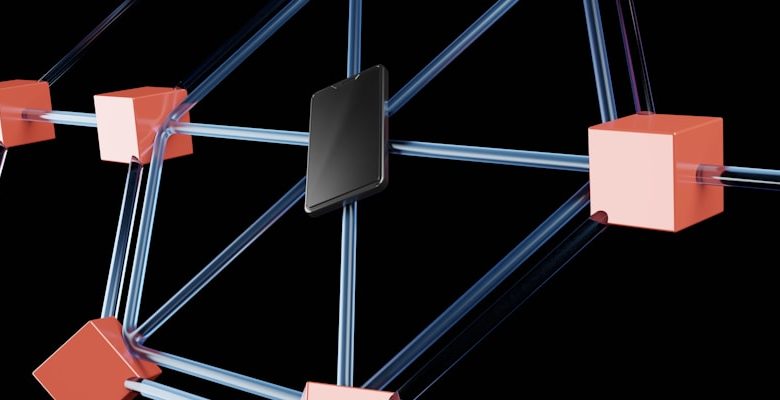How Blockchain Is Enhancing Cybersecurity Measures

- Understanding the basics of blockchain technology
- The role of blockchain in securing data and transactions
- Implementing blockchain to prevent data breaches
- Enhancing authentication processes with blockchain
- The future of cybersecurity with blockchain technology
- Challenges and opportunities of integrating blockchain into cybersecurity measures
Understanding the basics of blockchain technology
Blockchain technology is a revolutionary concept that is changing the way cybersecurity measures are implemented. Understanding the basics of blockchain is essential in comprehending its impact on enhancing security in the digital world.
At its core, blockchain is a decentralized and distributed ledger technology that records transactions across multiple computers in a secure and transparent manner. Each block in the chain contains a unique cryptographic hash of the previous block, creating a chain of blocks that are resistant to tampering and fraud.
One of the key features of blockchain technology is its immutability, which means that once data is recorded on the blockchain, it cannot be altered or deleted. This feature ensures the integrity and authenticity of the information stored on the blockchain, making it a reliable and secure platform for conducting transactions.
Another important aspect of blockchain technology is its transparency, as all transactions recorded on the blockchain are visible to all participants in the network. This transparency helps to establish trust among users and prevents malicious activities such as data breaches and cyber attacks.
In addition to its security benefits, blockchain technology also offers increased efficiency and cost savings by eliminating the need for intermediaries in transactions. By streamlining processes and reducing overhead costs, blockchain technology is revolutionizing the way cybersecurity measures are implemented in the digital age.
Overall, understanding the basics of blockchain technology is crucial for organizations looking to enhance their cybersecurity measures and protect sensitive information from cyber threats. By leveraging the security, transparency, and efficiency of blockchain technology, businesses can stay ahead of the curve and safeguard their digital assets from potential risks.
The role of blockchain in securing data and transactions
One of the key advantages of blockchain technology is its ability to enhance cybersecurity measures by securing data and transactions. By utilizing a decentralized and immutable ledger, blockchain provides a high level of security that traditional centralized systems cannot match.
With blockchain, data is stored in blocks that are linked together in a chain, making it nearly impossible for hackers to tamper with the information. Each block contains a unique cryptographic hash of the previous block, creating a secure and transparent record of all transactions. This ensures that data integrity is maintained, and any unauthorized changes are immediately detected.
Furthermore, blockchain utilizes consensus mechanisms such as Proof of Work or Proof of Stake to validate transactions, adding an extra layer of security. This means that transactions must be verified by multiple parties before they are added to the blockchain, reducing the risk of fraud or cyber attacks.
Overall, blockchain technology plays a crucial role in securing data and transactions by providing a decentralized, transparent, and tamper-proof system. Its innovative approach to cybersecurity has the potential to revolutionize the way we protect sensitive information in the digital age.
Implementing blockchain to prevent data breaches
Implementing blockchain technology can be a game-changer when it comes to preventing data breaches in the digital age. By utilizing blockchain, organizations can enhance their cybersecurity measures significantly.
One key benefit of blockchain is its decentralized nature, which means that data is not stored in a central location. Instead, it is distributed across a network of computers, making it more secure and less susceptible to hacking attempts. This makes it extremely difficult for cybercriminals to breach the system and access sensitive information.
Furthermore, blockchain uses cryptographic algorithms to secure data, making it nearly impossible for unauthorized individuals to tamper with or alter the information stored within the blocks. This adds an extra layer of security to the data, ensuring its integrity and confidentiality.
Another advantage of implementing blockchain for cybersecurity is its transparency and immutability. Once data is recorded on the blockchain, it cannot be changed or deleted without the consensus of the network. This ensures that all transactions and activities are traceable and auditable, making it easier to detect any suspicious behavior and prevent potential data breaches.
Overall, incorporating blockchain technology into cybersecurity measures can provide organizations with a powerful tool to protect their data from cyber threats. By leveraging the decentralized, secure, and transparent nature of blockchain, businesses can enhance their defenses and safeguard their sensitive information effectively.
Enhancing authentication processes with blockchain
Blockchain technology is revolutionizing the way authentication processes are conducted in cybersecurity. By leveraging blockchain’s decentralized and immutable nature, organizations can enhance the security of their authentication mechanisms.
One key benefit of using blockchain for authentication is the elimination of single points of failure. Traditional authentication systems rely on centralized servers that can be vulnerable to cyber attacks. With blockchain, authentication data is distributed across a network of nodes, making it much more difficult for malicious actors to compromise.
Furthermore, blockchain provides a tamper-proof record of authentication events. Each authentication request is recorded on the blockchain, creating a transparent and verifiable audit trail. This not only strengthens security but also enhances accountability within an organization.
Another advantage of blockchain-based authentication is the use of cryptographic algorithms to secure data. Public and private keys are used to authenticate users, ensuring that only authorized individuals can access sensitive information. This adds an extra layer of protection against unauthorized access.
In conclusion, integrating blockchain technology into authentication processes can significantly improve cybersecurity measures. By leveraging its decentralized, tamper-proof, and cryptographic features, organizations can enhance the security and integrity of their authentication mechanisms, ultimately protecting sensitive data from cyber threats.
The future of cybersecurity with blockchain technology
Blockchain technology is revolutionizing the field of cybersecurity by providing a secure and transparent way to store data. By using a decentralized system of records, blockchain eliminates the need for a central authority, reducing the risk of cyber attacks and data breaches. This distributed ledger technology encrypts data and creates a tamper-proof system that enhances cybersecurity measures.
One of the key advantages of using blockchain for cybersecurity is its ability to provide secure authentication and identity management. With blockchain, individuals can have more control over their personal information and digital identities, reducing the risk of identity theft and unauthorized access to sensitive data. This enhanced security feature makes it difficult for hackers to compromise systems and steal valuable information.
Furthermore, blockchain technology can be used to create secure communication channels and protect data integrity. By encrypting communications and storing them on a decentralized network, blockchain ensures that information remains confidential and cannot be altered without detection. This advanced level of security is crucial in safeguarding sensitive data and preventing cyber threats.
As the use of blockchain technology continues to grow, the future of cybersecurity looks promising. Organizations are increasingly adopting blockchain solutions to strengthen their security measures and protect against evolving cyber threats. By leveraging the power of blockchain, businesses can enhance their cybersecurity posture and safeguard their data from malicious attacks. With its innovative approach to data protection, blockchain is set to play a crucial role in shaping the future of cybersecurity.
Challenges and opportunities of integrating blockchain into cybersecurity measures
Integrating blockchain into cybersecurity measures presents both challenges and opportunities for organizations looking to enhance their security protocols. By leveraging the decentralized and immutable nature of blockchain technology, businesses can strengthen their defenses against cyber threats. However, this integration also comes with its own set of complexities that need to be addressed.
One of the challenges of integrating blockchain into cybersecurity measures is the complexity of implementation. Organizations need to ensure that they have the expertise and resources to effectively deploy blockchain solutions. Additionally, interoperability issues may arise when integrating blockchain with existing security systems, requiring careful planning and execution.
On the other hand, the opportunities presented by blockchain in cybersecurity are significant. The transparency and traceability of blockchain can help organizations detect and respond to security breaches more effectively. By storing security data on a decentralized ledger, businesses can reduce the risk of data tampering and unauthorized access.
Furthermore, blockchain technology can improve the authentication and authorization processes, reducing the risk of identity theft and fraud. Smart contracts, a feature of blockchain, can automate security protocols and enforce compliance measures, enhancing overall cybersecurity posture.



